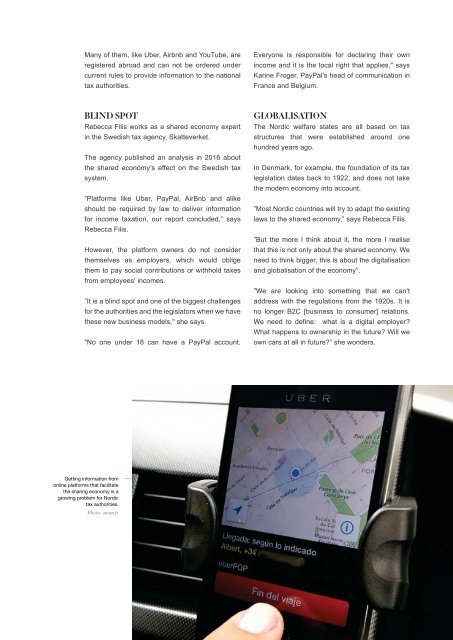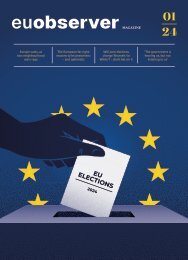How Europe manages the sharing economy
EUobserver's 2017 edition of its Business in Europe magazine takes a closer look at the the sharing economy.
EUobserver's 2017 edition of its Business in Europe magazine takes a closer look at the the sharing economy.
You also want an ePaper? Increase the reach of your titles
YUMPU automatically turns print PDFs into web optimized ePapers that Google loves.
Many of <strong>the</strong>m, like Uber, Airbnb and YouTube, are<br />
registered abroad and can not be ordered under<br />
current rules to provide information to <strong>the</strong> national<br />
tax authorities.<br />
Everyone is responsible for declaring <strong>the</strong>ir own<br />
income and it is <strong>the</strong> local right that applies," says<br />
Karine Froger, PayPal's head of communication in<br />
France and Belgium.<br />
BLIND SPOT<br />
Rebecca Filis works as a shared <strong>economy</strong> expert<br />
in <strong>the</strong> Swedish tax agency, Skatteverket.<br />
The agency published an analysis in 2016 about<br />
<br />
system.<br />
”Platforms like Uber, PayPal, AirBnb and alike<br />
<br />
for income taxation, our report concluded,” says<br />
Rebecca Filis.<br />
<strong>How</strong>ever, <strong>the</strong> platform owners do not consider<br />
<strong>the</strong>mselves as employers, which would oblige<br />
<strong>the</strong>m to pay social contributions or withhold taxes<br />
from employees' incomes.<br />
”It is a blind spot and one of <strong>the</strong> biggest challenges<br />
for <strong>the</strong> authorities and <strong>the</strong> legislators when we have<br />
<strong>the</strong>se new business models," she says.<br />
"No one under 18 can have a PayPal account.<br />
GLOBALISATION<br />
The Nordic welfare states are all based on tax<br />
structures that were established around one<br />
hundred years ago.<br />
In Denmark, for example, <strong>the</strong> foundation of its tax<br />
legislation dates back to 1922, and does not take<br />
<strong>the</strong> modern <strong>economy</strong> into account.<br />
”Most Nordic countries will try to adapt <strong>the</strong> existing<br />
laws to <strong>the</strong> shared <strong>economy</strong>,” says Rebecca Filis.<br />
”But <strong>the</strong> more I think about it, <strong>the</strong> more I realise<br />
that this is not only about <strong>the</strong> shared <strong>economy</strong>. We<br />
need to think bigger, this is about <strong>the</strong> digitalisation<br />
and globalisation of <strong>the</strong> <strong>economy</strong>”.<br />
<br />
address with <strong>the</strong> regulations from <strong>the</strong> 1920s. It is<br />
no longer B2C [business to consumer] relations.<br />
<br />
What happens to ownership in <strong>the</strong> future? Will we<br />
own cars at all in future?” she wonders.<br />
<br />
<br />
<br />
<br />
<br />
Photo: acanyi<br />
SHARING ECONOMY & EUROPE MAY 2017— 27


















